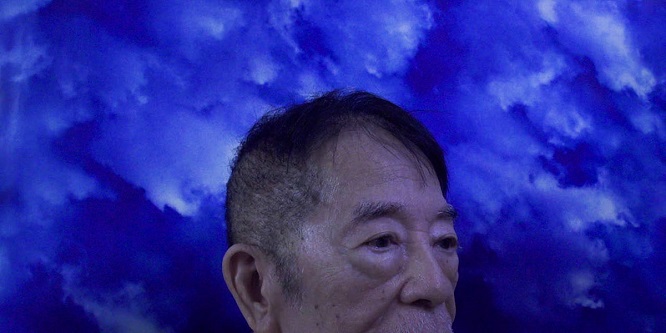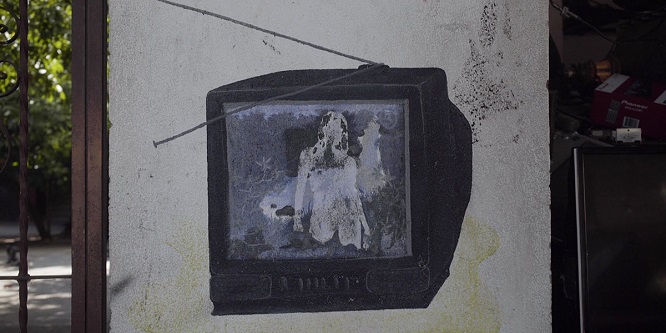|
Panorama-cinéma is back at TIFF after a four-year absence! Our columnist Mike Hoolboom, one of the most famous and lovely experimental filmmakers in the country, will share his thoughts about some films from the Festival lineup. Don't miss this chance to attend the event by proxy, but mostly to bask in Mike's unique and rousing verve, which will undoubtedly manage to fill your mind with images both inspiring and horrendous, as if you were attending the crowded Lightbox screenings in person. — Olivier Thibodeau, editor Festivals section |
 :: Nowhere Near (Miko Revereza, 2023) [Los Otros / Department of Stateless Images]
:: Nowhere Near (Miko Revereza, 2023) [Los Otros / Department of Stateless Images]
The camera lives inside tiny, overcrowded apartments and temporary shelters, the way stations of nomads. Miko chases jobs that turn into ghosts, while her mother couch surfs until she wears out her welcome. Every relationship turns into an economic relation. Miko and his family are part of the precariat, an undocumented and illegal workforce struggling for US identity cards and passports, a driver’s licence. But none arrive.
The cut is where images are put together.
The journey is driven by the artist’s soft-spoken observations, quietly poetic, vulnerable and touching, an embodied philosophy. And, on the other hand, there are sync sound family moments, stuffed into rooms where every surface teems with boxes, food, cartons, hands and faces intermingling. Where is the land that belonged to them back home, once gifted by the Spanish colonizers, and now repossessed by the new colonial landlords? They illuminate the old layers of colonial wounds using Google Street View, as ancient hands point at the screen, a flesh compass guiding the screens within the screen to a former school and the remnants of home.
Intertitles appear as footnotes, informing us that the Philippines is named after King Philip II of Spain. After 300 years of Spanish rule, the Americans take over, introducing an early version of the concentration camp.
It is also the line where they are fractured.
The movie is punctuated with an everyday lyricism, off-the-cuff shots made of boarded-up storefronts, lost telephone booths, ironized consumer slogans. One of the great joys of this film is how keenly the artist pays attention. Look at the way shadows fall on that strip of plastic orange mesh. Look at the kid holding a tuba as if it’s his second head. Let’s watch the suit bros pick over the racks so that they can look more like themselves.
While the act of looking, even the collection of lookings that every movie trades in, is usually pointed, filled with narrative arcs and portents; here the camera is set adrift because identity itself is unsettled. Being undocumented means that there are no neighbourhood ties, no friend network to carry families through the lean times. In place of security and standing, there is wandering and the keening intelligence of the underclass, as the artist traverses streets looking for a door he can step into and call home.
Cuts can be imagined as bridges or borders
I love this avant-garde home movie, the LSD with the picture of a Simpsons character on it, the Latinx couple who hold each other’s chins at the crosswalk, as if their heads would fall off if they didn’t have each other. And, of course, all around Miko, others are also busy shooting, only I know without needing to look at these traditional home movie snaps, that the artist brings something different to his frames. Because as his title declaims, he is forever near and nowhere at the same moment. He doesn’t belong, and that gives him a double vision that grants each image a rare depth.
from one image onto another.
Like thousands of others, his family’s work permits and citizenship documents were rejected after 9/11, as America reclaimed its roots in white supremacy. He recounts this while looking at the 9/11 memorial in New York, which features the names of the dead, and a vast memorial pool. How many people had to die to revenge this loss, and how many Americans-in-all-but-name were forced back into the shadows, sweeping American streets, taking out American garbage, caring for American children?
an entry and exit point.
This quest narrative pauses to replay Lumière’s Workers Leaving the Factory (1895), only here the workers are all fellow Filipinos, young and old, their tired faces resigned to the long commute home. And as part of the undocumented underclass, the camera waits until he can find the window washers and security guards, the deep infrastructure of shit jobs that keep the machine rolling, and that no one notices because the whole point of this labour is that it shouldn’t be visible.
Newsreels show MacArthur’s return to the Philippines after the Japanese invaders were driven out, only to be replaced by the American invaders. “The Americans came and bombed the town. They came armed with bubble gum, coca cola and jazz. They were so successful in their invasion that, when they left, we began to long for them.”
An edited film is an assemblage of broken parts.
His mother is the central character in America, while his grandmother escorts him through her island, the unrecognizable family home, stone entrance steps leading nowhere. The camera is suddenly incoherent, it doesn’t know where to look. There is nothing to see here, only America is visible, only there does his life come into some kind of focus, against the sharp background of empire. “The modern Filipino psyche is comprised of 300 years in the convent and 50 years in Hollywood.” This western misfit travelogue concludes with a wordless and elegiac collage that joins family portraits with faraway shores. Using the trope of superimposition, he can at last bring his many worlds together, even if only as an image, a torch of hope that carries on.

:: Nowhere Near [Los Otros / Department of Stateless Images]
*
Mike Hoolboom began making movies in 1980. Making as practice, a daily application. Ongoing remixology. Since 2000 there has been a steady drip of found footage bio docs. The animating question of community: how can I help you? Interviews with media artists for 3 decades. Monographs and books, written, edited, co-edited. Local ecologies. Volunteerism. Opening the door.

 |
envoyer par courriel | 
| imprimer | Tweet |
